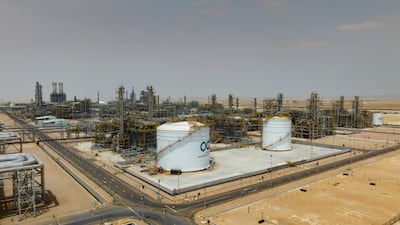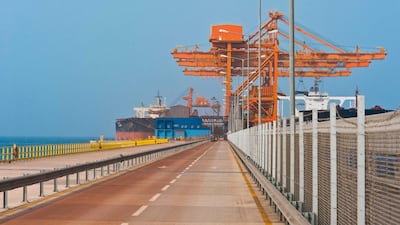The Red Sea attacks on commercial vessels have disrupted global trade and dented shipping volumes but the chaos has created opportunities, making it imperative for logistics operators to balance industry risks with growth strategies, a senior executive at Oman's Asyad Group has said.
While the attacks by Yemen's Houthis on cargo ship have stoked geopolitical tension, affected supply chains and raised shipping costs, higher container freight rates are helping logistics operators to offset the impact of lower trade, Muhsin Al Rustom, the chief financial officer of Asyad Group, told The National in an interview.
Backed by the Oman Investment Authority, the sultanate's sovereign wealth fund, the company manages Sohar port in northern Oman in partnership with the Port of Rotterdam, as well as Duqm port in partnership with Antwerp Port and Salalah port facilities in collaboration with Maersk.
The business is “very much stable and diversified” and while the Red Sea disruptions have posed challenges at some ports, “you would find an upside when it comes to container freight rates and other tanker market freight services as well”, Mr Al Rustom said.
“It very much balances itself out.”
The group manages $4 billion in assets and owns a shipping subsidiary that operates close to 100 vessels.
Many shipping companies have been forced to reroute their vessels around the Cape of Good Hope in South Africa to avoid the risk of missiles attacks in the Red Sea, resulting in longer travel times and higher costs that are being passed on to consumers.
The extended transit time has led to shortages and port congestion as shippers avoid the Suez Canal, a critical waterway connecting the Mediterranean Sea to the Red Sea.
The narrow shipping lane handles about 12 per cent of global trade, including commodities such as oil and natural gas.
Houthi attacks on cargo ships in the Red Sea have caused a 90 per cent slump in container shipping through the area between December and February, US intelligence officials were as quoted as saying by Bloomberg in June.
Though Asyad has fared relatively well despite the unprecedented crisis, the company has not been “immune” to continuing volatility, Mr Al Rustom said.
“I won't say we've encountered something of this magnitude and for this prolonged time before,” he said.
Earlier this year, Salalah port warned that the Red Sea attacks could lower container throughput volumes by up to a quarter for the remainder of this year.
“The disruptions in the Red Sea are having a significant impact on global container transport and, consequently, our operations in Salalah are also being affected,” the port operator said in its earnings report in May.
Salalah port has also launched a multimodal service connecting to the Saudi port of Jeddah as an alternative to rerouting via the Cape of Good Hope.
This means that goods can be transported by lorries from the Omani port to Jeddah, which is a safer location in the middle of the Red Sea.
The overland route takes about four to five days, after which goods can be shipped from Jeddah by container vessels through the Suez Canal to Europe or the US east coast.
“We've been helping other ports in the region … there are some lessons that we learnt as well from these crises where you can bring more of land, logistics [and] innovative solutions that also helped us revive the business,” Mr Al Rustom said.
“The location of Oman is advantageous but I think, geographically, once you expand, you will be more and more exposed to potential economical or social or political situations where you will have to be agile and innovative when it comes to your logistics solutions.”
M&A push
The group is countering risks with push for growth and is keen to acquire stakes in ports located in the Far East, East Africa and the Indian subcontinent, Mr Al Rustom said.
The move is part of efforts to bolster its shipping business and expand its footprint beyond the Middle East.
Asyad aims to secure controlling stakes but is willing to settle for smaller shareholding.
“It could be a minority [stake] … but we prefer a majority controlling stake where we can bundle our integrated logistics offerings,” Mr Al Rustom said.
“We're very much open to having partners, either international or local into the geographies where we're venturing into.”

Potential acquisition targets include ports, freight-forwarding platforms and logistics companies, Mr Al Rustom said, without giving further details on the timing or the value of potential deals.
Last week, Asyad announced the acquisition of UAE-based Skybridge Freight Solution.
The deal, Asyad's first international transaction in the logistics sector, will help to expand the company’s presence in key trade centres such as China, India, the US and the six-member GCC, it said at the time.
Asyad’s expansion plans come at a time when Oman is looking to position itself as a global trading centre.
The country aims to diversify its economy, which is largely reliant on oil export revenue, amid a push to become one of the top 10 global logistics centres by 2040.
Oman is investing heavily in modernising and expanding its ports, including Sohar and Duqm, to handle increased trade volumes.

Listing plans
As part of its broader growth plans, the company is looking to unlock value in its portfolio companies.
It plans to list its subsidiary Asyad Shipping on the Muscat bourse. The public offering is expected to finalised before the end of this year or early 2025, with the parent company retaining a majority stake, Mr Al Rustom said.
“You recycle your matured assets and then you go and invest in more organic and inorganic assets to expand your business and then diversify further,” he said.
Asyad's shipping unit has robust growth prospects, especially in the dry bulk market, aided by Oman's extensive mineral wealth.
“Oman is one of the largest exporters of some of the minerals [such as] gypsum and limestone and a lot of that gets carried with our … vessels,” Mr Al Rustom said.
The demand for transport in the petrochemicals and refined products sector has also grown since the launch of a refinery in Duqm in February, he said.
The refinery, known as OQ8, is a joint venture between Kuwait Petroleum International and Oman’s state-run energy company OQ.
It has a production capacity of 230,000 barrels per day and serves markets in East Africa and the Indian subcontinent.
“Given the geopolitical tension in the West, primarily what's happening in Russia and Ukraine, there's a huge demand for natural gas out of Europe [and] the US,” Mr Al Rustom said.
“Our liquefied natural gas vessels are also positioned very well for the future.”
The company will expand its shipping fleet to replace older vessels and to meet an expected rise in green hydrogen exports, Mr Al Rustom said.
“For us, if we don't expand, we are not standing still, we're actually diminishing in size because the fleet is not getting any younger,” he added.
“Now, the expansion for the country itself; when it comes to green ammonia and green hydrogen, that's just the cherry on top.”
The sultanate is developing several large green hydrogen projects that aim to decarbonise its industries and export low-carbon ammonia to other markets.
The International Energy Agency expects the Gulf country to become the sixth-largest exporter of hydrogen globally and the largest in the Middle East by 2030.

